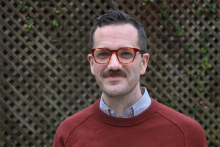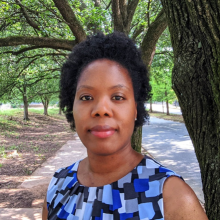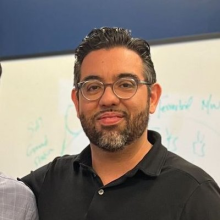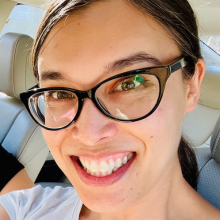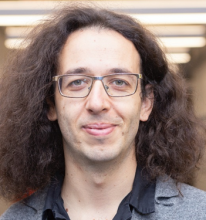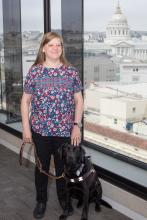Past Seminars
The HCII Seminar Series has been a weekly tradition at CMU since 1990. Details of our seminars from 2014 to present, as well as many of their recordings, are available below. A few years ago, we held a year of special programming in celebration of the seminar's 25th anniversary.
| Date | Title | Speaker | Talk title and Abstract |
|---|---|---|---|
| HCII Seminar Series - Abbie Jacobs |
Abbie Jacobs Assistant Professor of Information, School of Information, University of Michigan; Assistant Professor of Complex Systems, College of Literature, Sciences and the Arts, University of Michigan |
"From Cadavers to Categories: Unpacking Upstream Assumptions in AI" All technical systems depend on assumptions: about how the world works, about what the system is expected to do, about how we know if the system works (or not). Thus understanding systems–and if they work, and if… Full Details |
|
| HCII Seminar Series - Amy Bruckman |
Amy Bruckman Regents’ Professor, School of Interactive Computing, Georgia Institute of Technology |
"The Crisis in 'Knowledge': What HCI Practitioners Need to Know, and What We Can Do" What is “knowledge” and how do we find it in the presence of a growing number of epistemically unreliable agents? In the title chapter of my book Should You Believe Wikipedia?, I explain how… Full Details |
|
| HCII Seminar Series - Nick Seaver |
Nick Seaver Assistant Professor, Department of Anthropology, and Director of Program in Science, Technology, and Society at Tufts University |
"Computing Taste: Care and Control in Algorithmic Music Recommendation" The people who make music recommender systems have lofty goals: they want to broaden listeners' horizons and help obscure musicians find audiences, taking advantage of the enormous catalogs of music streaming… Full Details |
|
| HCII Seminar Series - Gahgene Gweon |
Gahgene Gweon Associate Professor, Department of Intelligence and Information, Seoul National University (SNU) |
"Harnessing (big) data and (AI) technology in shaping HCI research for real impact" With the recent advancement of AI technology, we frequently encounter AI-based systems with impressive demonstrations. However, despite the remarkable demonstrations, building systems that can… Full Details |
|
| HCII Seminar Series - Dan Weld |
Dan Weld Chief Scientist and General Manager of Semantic Scholar at the Allen Institute of Artificial Intelligence, and Professor Emeritus at the University of Washington |
"Intelligence Augmentation: Effective Human-AI Interaction to Supercharge Scientific Research" Recent advances in Artificial Intelligence are powering revolutionary interactive tools that will transform the capabilities of everyone, especially knowledge workers. But in order to… Full Details |
|
| HCII Seminar Series - Vernelle Noel |
Vernelle Noel Lucas and Rita Caste Assistant Professor in Architecture and Urban Design, Assistant Professor of Computational Design, Carnegie Mellon University |
"Craft, Culture, and Computing" Craft practices and communities are embedded in histories and cultures of knowledges and innovations. Many of these practices, histories, and knowledges are at risk of disappearance due to dying practitioners, erasure, and technocentric developments… Full Details |
|
| HCII Seminar Series - Parastoo Abtahi |
Parastoo Abtahi Princeton University |
"From Haptic Illusions to Beyond Real Interactions in Virtual Reality" Advances in audiovisual rendering have led to the commercialization of virtual reality (VR) hardware; however, haptic technology has not kept up with these advances. While haptic devices aim to bridge this gap… Full Details |
|
| HCII Seminar Series - Ben Green |
Ben Green Assistant Professor, University of Michigan School of Information, and Assistant Professor (by courtesy) in the Gerald R. Ford School of Public Policy |
"Algorithmic Realism: Data Science Practices to Promote Social Justice" Data scientists have confronted a gap between their desire to improve society and the harmful impacts of their creations. While algorithms once appeared to be valuable tools that advance social justice, today… Full Details |
|
| HCII Seminar Series - Alvitta Ottley |
Alvitta Ottley Associate Professor, Computer Science and Engineering Department, Washington University (St. Louis, MO) |
"Bridging AI and Visual Analytics" Visualization research has long been dedicated to finding innovative approaches to represent complex data sets and convey insights to analysts. However, the advent of artificial intelligence (AI) introduces a paradigm shift, presenting new… Full Details |
|
| HCII Seminar Series - Narges Mahyar |
Narges Mahyar Assistant Professor, Manning College of Information and Computer Sciences, University of Massachusetts Amherst |
"Harnessing Data for Social Impact: Empowering Communities through Visualization and Social Computing" Abstract: Today’s world faces several complex problems, such as climate change, transportation, infrastructure, education, and healthcare. Technology, if designed right, can play… Full Details |
|
| HCII Seminar Series - Jorge Ortiz |
Jorge Ortiz Assistant Professor, Electrical and Computer Engineering, Rutgers University |
"Advancing Human-Machine Interactions: Multimodal Learning in Densely Sensed Spaces" The proliferation of ubiquitous computing and instrumented environments has catalyzed multimodal learning as a pivotal paradigm for enhancing real-world applications and interactions. From… Full Details |
|
| HCII Seminar Series - Astro Teller |
Astro Teller co-founder and Captain of Moonshots (CEO) of X, Alphabet's moonshot factory |
Astro will speak on what makes "moonshot" innovation; how organizations embrace or resist innovation; and what leadership may look like in the age of AI. Come prepared to ask questions and engage in conversation! |
|
| HCII Seminar Series - Noboru Matsuda |
Noboru Matsuda Associate Professor, Department of Computer Science, North Carolina State University |
"Learning by Teaching a Synthetic Peer: Lessons Learned, Now, and Then" A teachable agent (TA) coupled with an online learning environment where students learn to solve problems by interactively teaching the TA while receiving adaptive scaffolding is a unique implementation of… Full Details |
|
| HCII Seminar Series - Edward Wang |
Edward Wang Assistant Professor at UC San Diego, Electrical and Computer Engineering and The Design Lab |
"Elevating Access to Remote Health Monitoring Fairly" Many of today’s healthcare solutions do not provide access to the poor and are not racially fair. To address this, my group is leveraging the proliferation of mobile technology, particularly smartphones, as a ready-made… Full Details |
|
| HCII Seminar Series - Gregory Abowd |
Gregory Abowd Dean, College of Engineering, and Professor, Electrical and Computer Engineering, Northeastern University |
"Ubiquitous Computing Considered Harmful: A Two-Act Story of Getting Things Right for the Wrong Reason" I have been speaking and writing about the idea of an Internet of Materials for nearly a decade. It started as a way to rethink Mark Weiser's vision of ubiquitous computing in… Full Details |
|
| HCII Seminar Series - Tamara Kneese |
Tamara Kneese Senior Researcher and Project Director, AIMLab, Data & Society Research Institute. Visiting Scholar at the Center for Science, Technology, Medicine and Society at the University of California, Berkeley |
"From Socially Useful to Responsible Tech: Learning From Histories of Environmental Justice and Labor Rights in Silicon Valley and Beyond" At a time when “climate tech” has attracted the interest of venture capitalists and disaffected, laid-off tech workers alike, it seems… Full Details |
|
| HCII Seminar Series - Chris McComb |
Chris McComb Associate Professor, Department of Mechanical Engineering, Carnegie Mellon University |
"A Tool, A Teammate, A Coach: Human+AICollaboration in Design" Increasingly powerful artificial intelligence (AI) resources are accelerating the pace of engineering and design. At the same time, interacting with these AI resources stands to fundamentally change the way… Full Details |
|
| HCII Seminar Series - Fei Fang |
Fei Fang Associate Professor, Software and Societal Systems Department (S3D), School of Computer Science, Carnegie Mellon University |
"Game Theory and Machine Learning for Addressing Societal Challenges: From Theory to Real-World Impact" Societal challenges spanning security, environmental sustainability, food security, and transportation often involve complex decision-making by multiple self-interested… Full Details |
|
| HCII Seminar Series - Amy Ko |
Amy J. Ko Professor, The Information School, University of Washington, Seattle |
The Sujeath Pareddy Memorial Lecture and HCII Speaker Series PresentationTalk: "Searching for Justice in Programming Language Design"From its earliest days, computing has been an eclectic project of capitalism, war, colonialism, and white supremacy. Its central… Full Details |
|
| HCII Seminar Series - Hari Subramonyam |
Hari Subramonyam Assistant Professor (Research) at the Graduate School of Education and Computer Science (by courtesy), Stanford University |
"Rethinking the AI-UX Boundary for Designing Human-AI Experiences" In conventional software development, the boundary between user experience (UX) design and engineering is well defined: designers create specifications based on end-user needs, then engineers build to those… Full Details |
|
| HCII Seminar Series - Katie Davis |
Katie Davis Associate Professor, University of Washington Information School |
"Technology's Child: Digital Media's Role in the Ages and Stages of Growing Up" Abstract: What happens to the little ones, the tweens, and the teenagers, when technology, ubiquitous in the world they inhabit, becomes a critical part of their lives? Technology’s Child brings… Full Details |
|
| HCII Seminar Series - Ding Wang |
Ding Wang HCI Researcher at Technology and Society Collective (TaSC), Responsible AI, Google Research |
"The Work of Data Annotation and Annotator Diversity" Diversity in datasets is a key component to building responsible AI/ML. Despite this recognition, we know little about the diversity among the annotators involved in data production. Additionally, despite being an… Full Details |
|
| HCII Seminar Series - Danny Pimentel |
Danny Pimentel Assistant Professor of Immersive Media Psychology, University of Oregon |
"Changing Tides: Using Technology to Bridge Human-Nature Gaps and Spur Environmental Advocacy" Despite heightened societal awareness of climate change and its impact on biodiversity loss, human efforts to mitigate such threats remain stagnant for various reasons, namely the… Full Details |
|
| HCII Seminar Series - Pedro Lopes |
Pedro Lopes Assistant Professor in Computer Science, University of Chicago |
"Integrating Interactive Devices with the User's Body" The main question that drives my research is: what is the next interface paradigm that supersedes wearable devices? I argue that the new paradigm is one in which interactive devices will… Full Details |
|
| HCII Seminar Series - Eleanor O'Rourke |
Eleanor (Nell) O'Rourke Assistant Professor in Computer Science and the Learning Sciences at Northwestern University |
"Why Do Students Think They're Bad at Programming? Towards Intelligent Systems to Support Motivation and Learning in CS1" In this talk, I will introduce a surprising motivational challenge in the domain of computer science education: students often think they're bad at… Full Details |
|
| HCII Seminar Series - Mustafa Naseem |
Mustafa Naseem Clinical Assistant Professor, University of Michigan School of Information |
"Challenges and Opportunities for Designing Health Technologies for Men in Religiously Conservative, Patriarchal and Low-Income Societies" This talk will address the design challenges and opportunities in creating health technologies for men to improve the lives of women in… Full Details |
|
| HCII Seminar Series - Carol J. Smith |
Carol J. Smith Sr. Research Scientist, Human-Machine Interaction in the AI Division, Software Engineering Institute, Carnegie Mellon University |
"UXR for Responsible, Human-Centered AI" AI-enabled systems that are responsible and human-centered, will be powerful partners to humans in the very near future. User experience research (UXR) is necessary to create systems that people are willing to be responsible for. This… Full Details |
|
| HCII Seminar Series - Lace Padilla |
Lace Padilla Assistant Professor in the Cognitive and Information Sciences Department at the University of California Merced |
"Making Uncertainty Cognitively Accessible" We live in an uncertain world. From extreme weather events to pandemic forecasts, we are confronted with uncertainty every day. Unfortunately, uncertainty is highly challenging for both the general public and trained experts to understand, which… Full Details |
|
| HCII Seminar Series - Nica Ross |
Nica Ross Director, Frank-Ratchye STUDIO for Creative Inquiry & Associate Professor of Video & Media Design, School of Drama at Carnegie Mellon University |
"Invitations and Intentions: A Creative Practice informed by Queer Autonomy" Through the format of an artist talk Nica Ross will share select projects from their body of work through the lens of Queer cultural production. In addition they will discuss how their socially engaged… Full Details |
|
| HCII Seminar Series - Chancey Fleet |
Chancey Fleet Assistive Technology Coordinator at the New York Public Library and the Dimensions Project |
“De-Visualizing Images and Data: A Community-based Approach to Tactile Graphics Creation and Exploration" Tools and processes for creating tactile graphics (raised images usable by Blind and low vision people) have been available for decades, but the equipment and practices used to… Full Details |




